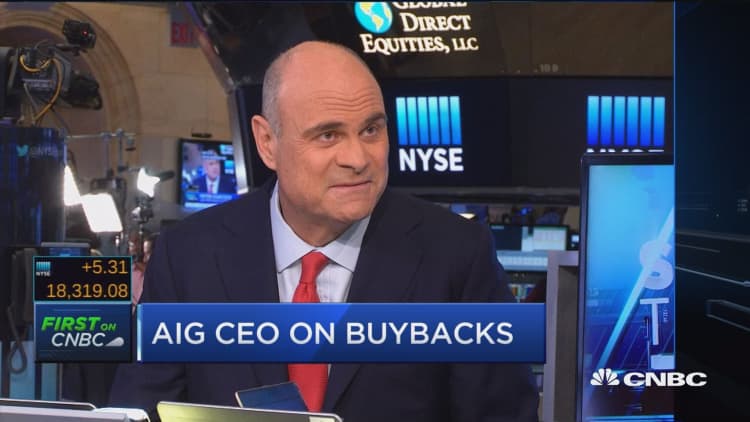
Shares of American International Group jumped 7 percent Wednesday after the insurer beat Wall Street estimates for quarterly profit and added $3 billion to its stock buyback program.
AIG was the biggest gainer on the S&P in afternoon trading. The stock closed at $58.10 on Wednesday.
The insurance giant reported adjusted second-quarter profit of 98 cents per share, 5 cents above estimates, helped by lower expenses and strong underwriting results. Total operating revenues were $695 million, down from $1.17 billion in the year-earlier period.
The company announced a $3 billion increase in its stock buyback program. AIG bought back an additional $698 million of AIG Common Stock, bringing the year-to-date capital return to $7.9 billion.
The source of AIG's earnings is shifting, president and CEO Peter Hancock told CNBC on Wednesday.
"We're getting our earnings from serving our clients in our core business of insurance, which has a much more repeatable element for higher quality earnings," Hancock told "Squawk on the Street."
In previous years, earnings have been driven by investment income, above-normal hedge-fund returns and market gains on noncore holdings, he said. AIG has since divested in noncore holdings and reduced its allocations to hedge funds. Market sensitive assets are down to about 7.5 percent from 11.5 percent in recent years, Hancock said.
Activist investor John Paulson and Samuel Merksamer, a managing director at Icahn Capital, joined the company's board last year after Carl Icahn campaigned to have the company split into three parts.
AIG rejected the proposal, and presented its own strategy in January that included buybacks. The company announced a spinoff of the mortgage insurance business and agreed to sell its broker-dealer network. AIG also said it would cut $1.6 billion of costs, and return at least $25 billion to shareholders over the next two years.
"We've found a lot of common ground, and I think that we continue to have an excellent relationship and discussion of the trade-offs of pace and focus," Hancock said. "We're delivering on the promises we made to all of our shareholders and recognizing that we serve them all."
AIG's $182 billion bailout from the U.S. government in 2008 after its near-collapse eventually led to its listing as a SIFI, or "systemically important financial institution." Icahn argued splitting up AIG could help rid the company of burdens that come with SIFI status, like higher capital requirements, according to Reuters.
But unlike Metlife and GE, AIG has not moved to shed its "too big to fail" status.
"Our customers rely on our industry to be heavily regulated," Hancock told CNBC, adding that the Fed is one of almost 200 regulators that the company is subject to across different jurisdictions. "For us to be overly focused on one regulator is a distraction from the core mission, which is to deliver value to our shareholders and to clients."
Shares of AIG are down 6 percent year to date and have fallen 9 percent year over year.


